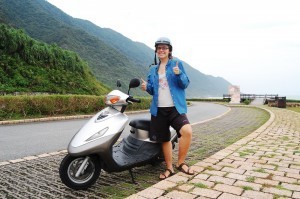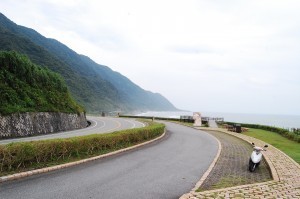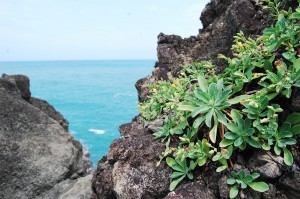Lisa Niver's Blog: We Said Go Travel, page 395
April 23, 2014
Gili Meno, Indonesia
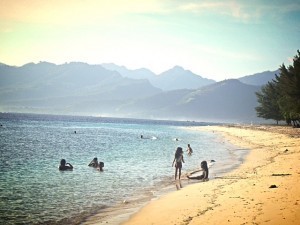 My travel book to Indonesia described the Gilis as a trio of beautiful islands so bare of resources that they were almost unlivable. Yet long before I got on the ferry I was warned by other ex-pats that at least one of the islands, Gili Trawangan, was packed with tourists, while another, Gili Air, was overwhelmed with luxury villas. And so I made plans to visit the third island, Gili Meno, the smallest, most uninhabited of the three.
My travel book to Indonesia described the Gilis as a trio of beautiful islands so bare of resources that they were almost unlivable. Yet long before I got on the ferry I was warned by other ex-pats that at least one of the islands, Gili Trawangan, was packed with tourists, while another, Gili Air, was overwhelmed with luxury villas. And so I made plans to visit the third island, Gili Meno, the smallest, most uninhabited of the three.
The islands were no more than a kilometer apart from each other, but for some reason pertaining to the tides the ferry would only stop at Trawangan. It was my good luck to be aboard a boat whose captain was gladly bribed, however, and for an extra ten rupiah I was taken as close to Meno as the vessel could go and told to walk the rest of the way, the water being only neck-deep.
Holding my pack above my head, I waded through the shallows and met the shore of an island whose indigenes had never bathed in anything but saltwater. My senses were instantly alive. Everywhere around me were the same enrapturing screensaver images that had mocked and dejected me during all those soul-stomping office gigs back in the States. “Keep dreaming”, those images had said in Boston. “Not in this lifetime”, they’d told me in LA. Now here I was.
I trekked along the water through a boneyard of washed-up coral fragments, the ocean so flat and smooth it might’ve been shaved with a razor. The swoop and call of opulent jungle fowl, the skull-faced woman draping laundry across the crab legs of a jukung canoe, the snorkeling tourist submarining across the fiercely-clear shallows—never had a place so definitively announced peace and simplicity.
With no trees on this stretch of the island, I crawled into the shade of some shrubby vegetation and opened my notebook, determined to articulate with poetic sensibility every exotic nuance around me. I sketched one elaborate ode after another, but when I read the words back to myself nothing felt “right”. The pretty jungle birds weren’t as lively or flamboyant; the old washwoman lost all her humble poignancy; the snorkeling tourist was drowned in extraneous description.
My enthusiasm fell off a cliff. What good was all this beauty if I couldn’t subjugate it? What good were pure blue waters, heaps of sumptuous white clouds, delicate breezes and tropical aromas if I couldn’t extract from them some inspiring perspective that would rouse the weary 9-to-5 world and send it sprinting toward the travel life?
I wandered down the beach until the heat beat me into the shrubs again. Fifty yards from shore a young native couple, no older than a pair of high-school kids, was teaching their baby daughter how to swim. The water was serene and they were barely waist-deep, but that didn’t matter to the child. The situation was a nightmare, and she clung for dear life to her mother’s waist, sobbing hysterically.
The boy-father took his time. Immersed to his shoulders, he bobbed around his daughter like a jellyfish, gingerly calling her name. With soft cajoles and gentle tones he would drift incrementally closer, then quickly drift back when her panicky sobs burst into wild distrustful shrieks. At last he waded over and unpeeled the girl from her mother’s body.
Gripping her by the armpits, he hoisted her above his head and smiled into her shrieking face, still saying her name as she kicked violently at his chest, still saying her name as he lowered her into the water and laid her on her back as though the sea were an operating table. With his arms scooped beneath her shoulders and thighs, he began to move her across the shallows, the child’s fearful moans rising to a horrible pitch, then dwindling with each second she didn’t sink.
After a while the father turned her over and showed her how to kick. Then he flipped her upright and taught her how to move her arms underwater, and how to stay calm when the ocean got near her mouth. In less than 20 minutes a flower of confidence had bloomed, and the girl was treading water without help, all her wailing terror replaced by a silent fascination with being afloat.
It’s possible to experience something so complete in beauty that you also see, at the same moment, something of beauty’s incommunicable nature. An hour earlier I would’ve crushed my mind around that scene like a fist and crammed it into my notebook. Now that instinct faded and my notebook stayed shut.
There was no one else on the island to bear witness to that event, no one who would’ve thought to look at it twice, anyway. Only me in the shadow of some nameless vegetation, watching with a kind of fixation that had nothing to do with forming a perspective or grasping for a message, but the perfect joy of being there when a bare island child, for the first time ever, drifted off from her parents and floated on her own.
About the Author: Timothy L. Marsh is a PhD candidate in Creative Writing at Aberystwyth University, Wales. He has lived in several countries in the last several years, including France, Indonesia, Ireland and South Korea.
Thank you for reading and commenting. Please enter our next Travel Writing competition and tell your story.
The post Gili Meno, Indonesia appeared first on We Said Go Travel.
The gift of love on my first spring in Chicago
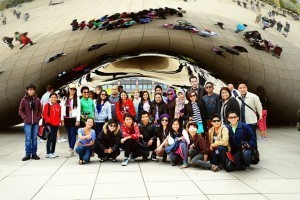 The 13th day of April 2013 was not an ordinary day of my life. I was halfway of the dream and the reality that happened so soon. It was a trip to the United States of America, a place where I had my memorable, first spring ever.
The 13th day of April 2013 was not an ordinary day of my life. I was halfway of the dream and the reality that happened so soon. It was a trip to the United States of America, a place where I had my memorable, first spring ever.
Young as I am, my age tells so much about my immense interest on taking adventures but this is unique among them all. This is not just about enjoyment, but is also about making a difference for my community someday. I am a participant of the Philippine Youth Leadership Program, a US-government program focusing on Ecological Activism.
My co-participant said, “How do we convert Fahrenheit to degrees Celsius again?” and everyone laughed.
It was the cold breeze in the windy city of Chicago that welcomed us. “This is not just a dream!” The jet lag experience has made me feel weak at the moment but not my courage to seize the opportunity that rarely comes.
During our stay, we did not only have lots of sessions and workshops that harnessed our leadership skills but also performed cultural dances that we are more than proud and honored to show to the American people – a reflection of the customs and traditions we have from the other side of the world.
It was in this springtime that the unexpected happen when the speaker said, “Guys, go out for a while because the snow may not last long!” In our extreme excitement, we all ran as fast as we could to finally experience something that we can never have way back home. It almost didn’t matter how cold it was because the heat of the moment is what that really prevailed. It was even made more memorable seeing those people around you, flashing their big smiles as they watch you enjoy these simple things.
Of course, the trip was fun and always will be here in the United States. But beyond all of these enjoyments, this is one that I will never forget – the people. It is different when you know them aside from what the books, media, and other references can tell.
Having dealt with few of them, I consider them not as showy of their affection as the typical Filipinos do. But even their subtlest deeds of love and concern are definitely overwhelming. I only had 12 days to stay with a host family and as I bid goodbye to my Mom, the tears that she shed really broke me inside. I even only saw my Dad twice but the last encounter, though was not long was still very heart-warming. “We may have not been together for a long time but you will always be welcome as part of our family if you’d come back.”
Most of all, they can also be very special friends! Some may not be as very welcoming to strangers that I wondered, “Is it really because they hate doing so or is it just because they hate saying goodbyes? I can still remember when a student from Rochelle High School asked me on that sad tone, “Guys, why do you make friends then leave?” Not knowing what to say, I just gave him a tight hug instead as if we’re friends for a long time.
There was also a guy we’ve met in an Intercultural Café that I thought it would be the last time that I’d see him but up to this day, he is still in touch with us through Facebook and Skype. It was very relieving that in time of troubles, especially when the earthquake and typhoon Haiyan devastated many parts of the Philippines, there’s someone from afar who’s willing to dedicate his time just to comfort and cheer us up. This really proved to me that even the long distance and the great time difference can’t be hindrances to a true friendship.
For me, this place has been even more special because of the special people in it. Not only did I learn new things, gain intercultural experience, and had more reasons to be the best of who I can be. But I’ve fathomed new definitions of love and friendship but have never devalued. It will always be comforting to know that you’ve got a family who cares for you when you are far from your own.
It took me a day to get to this place, but it will take me forever to ponder all of these beautiful things that God has allowed me to see – a time that’s very well spent. This was not just a sense of fulfillment but a tremendous source of motivation to make a difference, spread the love and happiness that were was no enough time to feel any regret.
Thank you for reading and commenting. Please enter our next Travel Writing competition and tell your story.
The post The gift of love on my first spring in Chicago appeared first on We Said Go Travel.
Once Bitten, Forever Happy in India
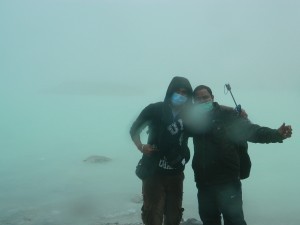 Once bitten, Forever Happy
Once bitten, Forever Happy
There is little merit in retelling a journey done before, but there is great joy in retracing one. The first time that I went to Spiti Valley in Himachal Pradesh (India) was over two years ago. That was with the family, but this one was with a bunch of fellow travellers, who were clueless about what lay in store!
My first visit to the valley had left an indelible mark on me with its unmatched landscapes, utterly bad roads, and lovely people. As we left Manali well before dawn, I wondered why I was willing to do this again! In a place as remote as Spiti, there were slim chances of change in a matter of few years. As we hit the turn from Gramphu after crossing the Rohtang Pass, I knew I was right; the passing valleys were as beautiful , the roads as bad. Thrice we had to get off and our driver lucky Singh take the Innova across the whimsical streams that made their own paths. It was later that I got to know (to my slight horror) that it was only his second trip!
We stopped for lunch at the lone Chandra Dhaba at Batal before we began the ascent to Kunzum La, Spiti’s highest pass. The dhaba still had only one couple serving simple but delicious fare to passing trekkers, army jawans, travellers and truck drivers. S we were mid-way up the narrow Kunzum pass road (If it may be called!), we saw a truck tilted precariously on its left wheels. It seemed to stay there simply by the grace of Kullu Devi, and would fall if you blinked! We had to manoeuvre our way around it, and in that heart stopping moment that I had experienced before and had had knowingly engaged in again, I turned around to look at the others. It was Paul and Anais’s first time in India. They had probably had in mind visions of dancing peacocks, forts and palaces, men in turbans and bejewelled women. Clearly, this was something else! Their shorts and tees were pretty useless at 14,000ft, their loo breaks were behind the giant boulders, and life depended on lucky Singh. But as we hit Losar and officially entered Spiti, The overwhelming beauty of the valley replaced jitters with squeals of ‘C’est magnifique!’
After nearly 12 hours on the road, we reached Kaza, the unofficial capital and ‘modern’ hub of Spiti. Other than being the gateway to all the mini destinations around, kaza is also the place to make last phone calls (no signals after this), recharge batteries, buy energy bars and toilet paper, and enjoy the last baked goodies. We made a slight change in our itinerary and we landed in Dhanker the following day. The view of the monastic settlement, the landscape of which is straight out of sci-fi set- tall boulders like Obelix’ was breathtaking. We visited Tabo, one of the most ancient monasteries of the region housing some very old and interesting frescoes.
By the end of my stay there, the long walks on the bed of the Pin tributary and the purples and browns of the stark mountains had instilled in me the universal humility, and I remembered why I return to such places.
We finally left the car in Pin Valley, trekked across a frightening stretch of trail, crossed the landslide rubble in an earthmover and hitched a ride back to Kaza with a bunch of PWD engineers who had come to inspect the damage. I muttered expletives through the tribulations, but once back home, I changed my mind. I missed being jostled uncontrollably, my bones rattled even as my eyes feasted on a visual banquet.
I might well return a third time.
About the Author: Harsh Agrawal is a 2nd year student of Bachelor of Engineering of Industrial Production in Birla Institute of Technology, Mesra, India. I am an ardent traveller and always get imprisoned by the spellbinding and unpredictability of the nature!
Harsh Agrawal.
Thank you for reading and commenting. Please enter our next Travel Writing competition and tell your story.
The post Once Bitten, Forever Happy in India appeared first on We Said Go Travel.
April 22, 2014
Finding the Infinite in Taiwan
Part 1
“Don’t do it, Amber. Its too dangerous.”
“You don’t speak the language, this is a dumb idea.”
“Are you crazy?”
Despite what my worried friends told me, I knew that after gallivanting through Asia for the last 6 months , it was the right time to take off on a solo motorbike trip in Taiwan. Sure, I couldn’t read most of the signs, but I had come this far, and likely could survive on sign language as I had in Vietnam, Thailand, and Cambodia.
Using the immaculate public transportation and a map from my hostel, I navigated my way to the main train station in Taipei, and identified where to buy tickets. While puzzling over the different options and holding up the line, I must have looked confused, because a Taiwanese couple offered to help me.
Miraculously, the next day I arrived in Hualien, a touristy town famous for its moon cakes. Step one: rent a scooter.
Most of them required an international drivers license – mine had expired – but I found a rental office being managed by a 13 year old girl who was clever enough to open up Google Translate so we could communicate. Through typing and sign language we agreed on a price, $10/day for 4 days, and I was about to pay in advance when her father came in.
Smelling of alcohol, her dad tried to renegotiate. He told me again and again in Chinese something I couldn’t understand – he couldn’t wrap his head around the fact that I didn’t speak any Chinese. His daughter entered it into Google Translate, and apparently he was insisting that I pay in advance, which I was already planning to do anyway.
Finally, I hopped on my silver scooter and rode straight out of town. I left most of my stuff at the hostel, only taking with me a small day-pack with a few clothes, my journal, and a camera.
How did I get to be so lucky? I felt so joyful and empowered. It was difficult to worry about anything, with the wind in my hair, the green-brown mountains reaching up to my right, and the vast blue ocean to my left. “It’s complete and utter freedom to be here, in this moment,” I thought to myself.
More spectacular than the scenery was my inner joy at the moment. There I was, traveling alone, as a woman, in a country where I didn’t speak the language, and having the time of my life – that is what travel is all about. “I can do anything,” I thought as the world zipped by me.
To Be Continued…
“Whoever you are, no matter how lonely, the world offers itself to your imagination…”
~Mary Oliver
Thank you for reading and commenting. Please enter our next Travel Writing competition and tell your story.
The post Finding the Infinite in Taiwan appeared first on We Said Go Travel.
The Magic of Moab
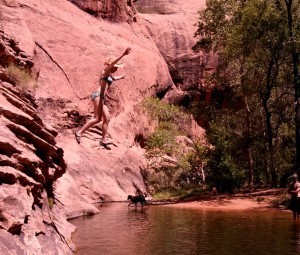 I arrived in the middle of the night, disoriented by the long empty highway I followed from Grand Junction, Colorado, into Utah. I passed cliffs stained pale green by copper, turnoffs for dozens of ghost towns marked by “No services” signs. I watched the sun sinking behind stark grey mountains. It was July, and over a hundred degrees, but I could still see wisps of snow at their peaks. Clouds hovered over them, mimicking their shapes. There are places in the West where you can drive for two hundred miles without passing a gas station, sometimes without seeing another car. Your mind vibrates in strange new ways in all that space. I could die out here, you realize. If the car broke down. If my cell phone stopped working. If no one stopped to help.
I arrived in the middle of the night, disoriented by the long empty highway I followed from Grand Junction, Colorado, into Utah. I passed cliffs stained pale green by copper, turnoffs for dozens of ghost towns marked by “No services” signs. I watched the sun sinking behind stark grey mountains. It was July, and over a hundred degrees, but I could still see wisps of snow at their peaks. Clouds hovered over them, mimicking their shapes. There are places in the West where you can drive for two hundred miles without passing a gas station, sometimes without seeing another car. Your mind vibrates in strange new ways in all that space. I could die out here, you realize. If the car broke down. If my cell phone stopped working. If no one stopped to help.
As I drove through the town of Moab, I was reassured by the crowded restaurants and neon signs, the drunk tourists stumbling into the road. Music drifted through the night. I turned down the road where I was staying, and the lights receded in the distance. To my right, moonlight rippled on the Colorado River; to my left, the cliff face loomed, a shadow blocking the stars. My headlights surprised mule deer and revealed cairns by the side of the road. A buck ran along beside me as I drove. By the time I found the right campground, exhausted, and sunk gratefully into my friend’s bed, I was half-convinced I’d dreamt the last few hours.
My first week in Utah, it was hard to breathe. Heat prickled my throat. I hadn’t yet acclimated to the elevation, so hiking was difficult, but I pushed through, exploring the canyons, chasing skittering lizards across the sand with my friend’s dog. I was surrounded by cliffs and stunted trees, the smell of juniper and sunbaked earth. Brightly-colored flowers bloomed amid cactus needles. The cliffs were dusty red, streaked by slicks of iridescent black desert varnish.
My second week in Moab, I was at a café when it started to rain, and everyone ran outside, shouting and laughing, opening their mouths to catch the drops. I’m from Virginia, and it storms there almost every day in the summer; but in the desert the rain was miraculous. It streamed down the faces of the cliffs, formed waterfalls in the fissures between them. The path next to our campground became a muddy, rushing river. The rain washed the Colorado river red. Everything was red, even the sky at dusk that evening.
I slept in an old RV and got used to my feet always being dirty, covered with dust, my skin scummed with sweat and grit. I realized that I didn’t need as many things, to take up as much space as I thought I did. There were bats living in the camp showers, and I had to duck and scurry, brandishing my shampoo bottle in front of me in case they swooped too close. I could hear scratching sounds inside the RV at night. I had to go into town to make phone calls.
I found secret swimming holes, deep crevices in the rocks where I floated on my back and watched planes make trails through the sky. I stood under pounding waterfalls, the water so cold it made me gasp. I drove to the mountains to escape the heat. It was a totally different climate up there, at least twenty degrees cooler than the desert around it. The trees, the smell of wood and leaves reminded me of home. The higher I got, the heavier my limbs felt. Suddenly the path opened, revealing a field of purple wildflowers. Herds of cattle grazed and bellowed. They all stared at me in unison as I walked by. I thought about the fact that cows kill more people than sharks every year.
I didn’t go home when I had originally planned. I got a job working at a restaurant on a cliff above the town. The building used to be the home of the town’s most famous man, who got rich mining uranium in the 50s. I got to watch the sun dip below the cliffs every night, see all the lights of the town blink on. I saw my first scorpion run across the floor while drying glasses in the kitchen one night. On my nights off, I sat in the camp chair outside the RV and watched the sky change, the sun set behind hoodoos, the birds gliding high above me, until the stars came out, as bright and close as I’d ever seen them. Camp fires winked and dogs barked in the distance. I soon lost count of all the shooting stars I’d seen. I was all out of wishes.
About the Author: Adriane Hanson is a writer and artist from Richmond, Virginia. She has worked as a turtle-walker, teacher, editor, and lifeguard. She is currently at work on a novel.
Thank you for reading and commenting. Please enter our next Travel Writing competition and tell your story.
The post The Magic of Moab appeared first on We Said Go Travel.
Brook Farm, UK taught me how to be
 I found Brook Farm on the Internet. Isn’t that how all the best 21st century relationships begin?
I found Brook Farm on the Internet. Isn’t that how all the best 21st century relationships begin?
My husband and I were looking for a Workaway position in England when we came across Sarah and Will Wint’s Worcestershire garden and bed and breakfast business. A handful of e-mails and eight months later, Dave and I arrived at Brook Farm in the pouring rain, as is a proper British welcome.
I went to Brook Farm full of goals for my time there. I was going to blog three times a week, submit freelance articles monthly, get fit by bicycling to the local village and wandering the public footpaths, and I was going to start my work day early each morning to ensure I had afternoons free to explore the area. I didn’t want to waste a moment of my time at Brook Farm.
If that list is my only measurement for success, then I managed to waste every single moment of the nearly three months I lived at Brook Farm. I never rode a bike to the village, I blogged only sporadically, and I didn’t usually start my work day until after 10 a.m. and worked until dark.
I did other things, though. I journaled over a cup of tea in the mornings. I wandered the garden with my camera, carefully taking perfectly detailed shots of rain drops on green leaves. I watched the chickens eat bugs, and I hunted for hidden stashes of eggs. I stopped by Sarah’s desk in the evenings, laughing about the latest silly thing one of the 13 cats did.
The goals I had for my time at Brook Farm were rubbish. Ticking off items on a list of “proper” ways to spend my time was silly, but I do love a list. So often we think there are right and wrong ways to spend our time. Things we should be doing and things we should not be doing. I should have kept my full-time job in journalism, and I should have still been living my secure Kentucky life. I should not have given it all up in favor of working for a stranger while not earning an income. Luckily, it’s easy to forget those unimaginative axioms when you are busy painting walls, trimming rose bushes, installing fences, mending cracks, obliterating cobwebs and building some of the greatest friendships.
I never made a conscious decision to abandon my Brook Farm goals. But Will told us one night that his best hope for the Workawayers they hosted each winter was that they come and “just be part of the place.” Without realizing it, I did just that. I simply became a part of Brook Farm, another facet to complement its old farmhouse, menagerie of pets, and beautiful gardens. Goals faded away and somehow, I began to just “be.” It was an entirely new feeling for me. I have always been so focused on what comes after the “be”–I wanted to be a writer, be a photographer, be adventurous, be a good daughter, be a good wife, be successful, be fit. I wanted to be so many things, and yet I had never learned how to just be. Brook Farm, with its 550-year-old farmhouse and its acres of English gardens and its silly collection of pets and farm animals worked its way into my soul like no place had done before. The rhythmic creaking of that gorgeous old house and the soothing babble of the eponymous brook became the tempo of my heartbeat. Brook Farm is where I proved to myself that I can do anything, and that includes nothing. The value of my time is not determined by whether I wrote an award-winning article or built a perfect fence. If I stopped to admire the snow drops, listened to the silence or just enjoyed taking a deep breath after an evening rainstorm, my time was not wasted.
About the Author: Amanda Loviza Vickery is an American journalist currently living in England and embracing local life through Workaway, a cultural work exchange that allows her to do anything from building a shed to wiping a cat’s nose.
Thank you for reading and commenting. Please enter our next Travel Writing competition and tell your story.
The post Brook Farm, UK taught me how to be appeared first on We Said Go Travel.
April 21, 2014
Monologues of A Single Lady Travler in China
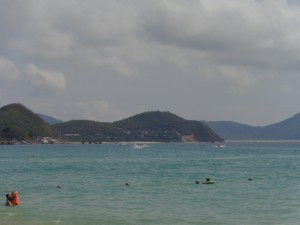 She walked in everyone was looking at her, by herself, she thought it could be paranoia. Feeling a bit uneasy by the idea of staying in a Resort by herself, no family, or friends, just her by herself. She thought, “who does that?” Then, she said to herself, ” I do!”. She began to peruse the room with her brown eyes, she noticed the families, babies, foreigners, and of course Chinese. If only she could speak Chinese, what would she say, “Hi, can I join you ?” Or, maybe “How long are you here for?” The cafeteria was buzzing with the clink and clang of dishes, little children running around, and the quietness inside her mind. She noticed women doting on their husbands and getting food, she thought Chinese women were in a way very subservient to their men in a fashion that in America, women are not quite so subservient. She couldn’t ignore the feeling of being misplaced, alone – yet, strong and courageous and she asks herself, “Is it too bold? Do people do this?” Am I the only one? Sitting at her garden table wearing a tight black tank top and skinny tight blue jeans, she realized she felt a bit out of place because she tends to forget people might be looking at her because she is black. Every time she passed a mirror she sees her curvaceous body that she feels, in this part of the world is starting to resemble Kim Kardashian. In a way, that made her a little skeptical, as she remembers the cab ride from the airport to the hotel and the driver was being a bit strange. He kept saying, “Ni Ho” with a certain look then tried to rub her leg. She quickly gave him the money and said, “Tajian” GOODBYE!! She thinks, I hope that doesn’t happen again. As she is sipping her coffee and enjoying the smell of the ocean coming through the open windows, she remembers her massage from the same city, where the masseuse tried to feel her up in the name of a massage. That massage ended very quickly, but she couldn’t stop to think how maybe this is how the Chinese are. She wondered why the masseuse was not a women. Then, maybe she thought the women were busy giving “happy endings” to the men, she chuckles to herself “China”. She brings herself back to the resort cafeteria and thinks, ” well no one will notice me here.” She tends to down play her looks. Her beautiful almond shaped eyes, her lashes, her silky brown skin, bold pink lips,and long kinky curly hair that she usually pulls back. She is not aware of her attraction or beauty. As she sits, she thinks why does being black play into a traveler? Or, how people see her? She realized she is always called African or people think she is from South Africa. This bothered her, why couldn’t she be a Black American? Why was that not what came to thought first? She knew there was something to this thought and would revisit it for it says a lot about how people see her in the world or Black Americans. Something about it she thought was strange. As she looks up from her table a women smiles, she smiles back. She starts to get a warm feeling, she thinks all she has right now to comfort her is her writing. She was about to break down in tears. Then, she thought no this is why she is writing, because, she is feeling things – sad, happy, lonely, alive, adventurous, and beautiful. The emotions overwhelm her she thinks back to the United States and she realizes all the things she left behind and the new things she will begin. She brings her mind back to current and present. She misses home and misses the familiar.
She walked in everyone was looking at her, by herself, she thought it could be paranoia. Feeling a bit uneasy by the idea of staying in a Resort by herself, no family, or friends, just her by herself. She thought, “who does that?” Then, she said to herself, ” I do!”. She began to peruse the room with her brown eyes, she noticed the families, babies, foreigners, and of course Chinese. If only she could speak Chinese, what would she say, “Hi, can I join you ?” Or, maybe “How long are you here for?” The cafeteria was buzzing with the clink and clang of dishes, little children running around, and the quietness inside her mind. She noticed women doting on their husbands and getting food, she thought Chinese women were in a way very subservient to their men in a fashion that in America, women are not quite so subservient. She couldn’t ignore the feeling of being misplaced, alone – yet, strong and courageous and she asks herself, “Is it too bold? Do people do this?” Am I the only one? Sitting at her garden table wearing a tight black tank top and skinny tight blue jeans, she realized she felt a bit out of place because she tends to forget people might be looking at her because she is black. Every time she passed a mirror she sees her curvaceous body that she feels, in this part of the world is starting to resemble Kim Kardashian. In a way, that made her a little skeptical, as she remembers the cab ride from the airport to the hotel and the driver was being a bit strange. He kept saying, “Ni Ho” with a certain look then tried to rub her leg. She quickly gave him the money and said, “Tajian” GOODBYE!! She thinks, I hope that doesn’t happen again. As she is sipping her coffee and enjoying the smell of the ocean coming through the open windows, she remembers her massage from the same city, where the masseuse tried to feel her up in the name of a massage. That massage ended very quickly, but she couldn’t stop to think how maybe this is how the Chinese are. She wondered why the masseuse was not a women. Then, maybe she thought the women were busy giving “happy endings” to the men, she chuckles to herself “China”. She brings herself back to the resort cafeteria and thinks, ” well no one will notice me here.” She tends to down play her looks. Her beautiful almond shaped eyes, her lashes, her silky brown skin, bold pink lips,and long kinky curly hair that she usually pulls back. She is not aware of her attraction or beauty. As she sits, she thinks why does being black play into a traveler? Or, how people see her? She realized she is always called African or people think she is from South Africa. This bothered her, why couldn’t she be a Black American? Why was that not what came to thought first? She knew there was something to this thought and would revisit it for it says a lot about how people see her in the world or Black Americans. Something about it she thought was strange. As she looks up from her table a women smiles, she smiles back. She starts to get a warm feeling, she thinks all she has right now to comfort her is her writing. She was about to break down in tears. Then, she thought no this is why she is writing, because, she is feeling things – sad, happy, lonely, alive, adventurous, and beautiful. The emotions overwhelm her she thinks back to the United States and she realizes all the things she left behind and the new things she will begin. She brings her mind back to current and present. She misses home and misses the familiar.
The Smell of Childhood Memories
Sitting by the pool, laying on the lounge chair, there was a familiar smell of mill dew from the cushion. Oddly, it reminded her of how she grew up, the smell resembled the orange life preservers she wore every summer on her family boat. She saw the water glistening in the sunlight and flashed to the day she was on the boat and she caught a “Sea Robin”. What is it called? She asked her brother. He said, “It’s a Sea Robin” throw it back in her father says. She said, “why? ” He let her know that they are poisonous and can’t be eaten. At that point, her brother took it off the hook and threw it back in. Wearing her little orange life preserver on her thin brown frame, she was so excited to have caught something, since it was a struggle for her to bring the fish in the boat. They pulled the anchor and continued up the channel. Her brother informed everyone they were heading to the beach. She thought this was her favorite part of the trip, but it was already a great day! Her brother shouts, “Dad can I drive the boat?” She remembers the wind, the fast speed of the boat, and the smell of the mill dew on her life preserver. She isn’t a little girl anymore, she gets up from the lounge chair and dives in the pool. She thinks to herself China is a long way from the Atlantic Ocean.
About the Author: My name Robin Glassberg I am from the United States currently I live in China. I am an educator and have been teaching and writing for over ten years.
Thank you for reading and commenting. Please enter our next Travel Writing competition and tell your story.
The post Monologues of A Single Lady Travler in China appeared first on We Said Go Travel.
Welcome to the Double J in Texas
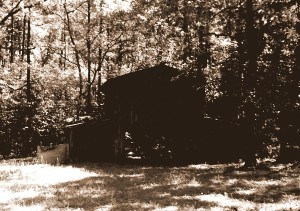 Welcome to the Double J in Texas
Welcome to the Double J in Texas
By Laura Romero
“Welcome the Double J.” That is what the sign read at the entrance to my grandparents’ property. Welcome the Double J. The Double J is a three acre piece of land nestled in the heart of the Big Thicket in East Texas. The Double J stands for Judson and Jo Evelyn. They were my grandparents and their home was where I spent numerous Spring Breaks, Summer Vacations and Christmas Visits.
My grandparents’ home was more than just a place to visit the elderly couple that taught me everything I needed to know about life and love. It was a place to run free in fresh country air, to till damp soil in a sprawling garden, to play house in a weather beaten barn and to pick mulberries fresh from the source. There was no such thing as wasting time at the Double J. Chores like shelling peas became a family affair on the glass enclosed porch with the sun pouring in and my Paw Paw’s skilled hands showing the way. Cooking dinner was a social event. We all gathered in the kitchen with my grandma to lend a hand and share stories of the day’s events. Life was carefree and we knew nothing but the embrace of love and family.
My sister and I had wonderful adventures with our cousins. We made up games and discovered the rich land around us. The thick stand of woods surrounding our favorite escape was heavy with the scent of pine during even the harshest of winters and still hung in the air on the rare occasions we got a dusting of snow. Dirt roads led to historic cemeteries and homegrown churches. Families sold eggs, berries, pies, jellies and jams of the most delicious varieties. Our taste buds were exposed to new flavors nearly every trip we made to the Double J.
Eventually, I grew from child to a woman. I had children of my own, which made my grandparents even greater, and still I visited them at the Double J. My children found great joy in exploring the same property I did, which still includes the barn, now more weathered and beaten by storms and sun, and an ancient corn crib, affectionately referred to as the log cabin. We often took walks after dinner to the same historic cemetery down the same dirt road. My Grandma read the same books to my children that she read to me once upon a time ago. Kisses were given before bed and antiquated quilts covered my children as they fall asleep as thousands of twinkling stars shone through open windows.
I soaked it all in; every moment, every play date, every kiss and every starry night. Slowly, the garden grew smaller and eventually turned to turf. The dinners became more pre-made and less home made, but no less a social affair. The voices grew quieter and the eye glasses got thicker. The walks got shorter. The hugs got weaker. The kisses softer. And one day, the family was decreased by two. But we could never have loved anyone more than we loved my grandparents and their home in the heart of the Big Thicket.
The Double J sign is gone now. When we make the three hour trek to their property, the anticipation is gone. We no longer meet for playdates, but rather to reminisce and divide memories amongst ourselves. The yard is overgrown and the garden is gone. Those same antiquated quilts keep us company at my own home, now. I make the family recipes in my own kitchen. I keep family traditions alive by passing them on to my kids. Our time in the Piney Woods has come to an end, but instead of looking back in sadness and regret I see only a lifetime of happiness and memories thanks to time well spent with my family at the Double J.
About the Author: Laura Romero is a blogger based out of Houston, Texas. Though her travels may not take her out her home state very often, life is always an adventure at with her husband and three kids.
Thank you for reading and commenting. Please enter our next Travel Writing competition and tell your story.
The post Welcome to the Double J in Texas appeared first on We Said Go Travel.
In Photos: Tri Hita Karana
The cultural landscape of Bali in Indonesia is largely shaped by the traditional belief systems of its locals. Tri Hita Karana — roughly translated into English as “the three causes of prosperity” – is a philosophy that governs and guides the daily lives and attitudes of Balinese. This unique concept puts premium to the universal respect of and observance to the three domains of the world: the divine (Gods), the universe (nature), and the domain of the people (human beings). This doctrine is said to be best illustrated during many special ceremonies, the most common of which would be the various acts of worshiping.
In this article, I am sharing what I believe is the easiest demonstration and most obvious material cultural manifestation of the practice of the rather difficult to understand concept of Tri Hita Karana:
The realm of the divine. Worships and offerings made inside public temples (major temples such as the sea temples, water temples, the directional temples, and village temples) are dedicated to the gods who created life, and nature and all of its gifts.
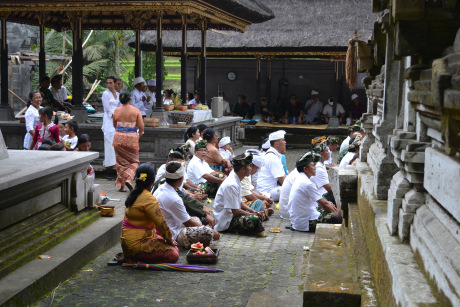
Balinese Hindu villagers attending a ceremony in the monastery of Candi Gunung Kawi in the subak landscape of the Pakerisan watershed.
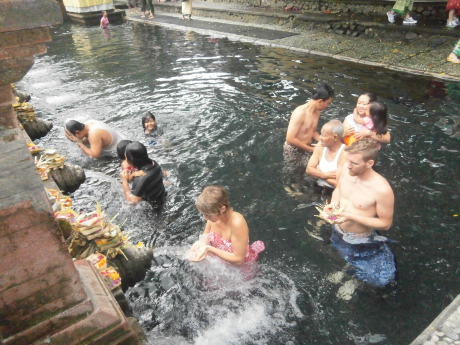
Locals and some converts are making their pilgrimage in the sacred Pura Tirta Empul, the source of holy water that flows out to the waterways and irrigation systems in Tampaksiring.
The realm of universe. Offerings made outdoors (streets, parks, rice fields and the like) are exponents of worships to nature, the domain that sustains and supports the needs and activities of humans.
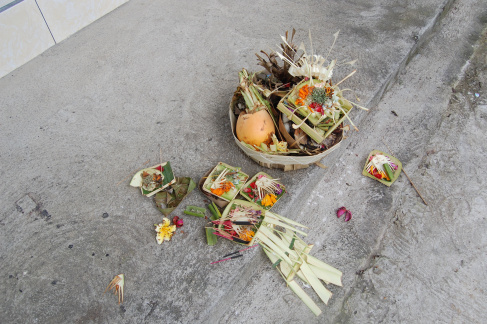
Bantens, the traditional offerings in Bali, scattered on the walkways in Ubud. This one was seen on the way to Sari Organik, a restaurant in the middle of the rice paddies in Central Bali.
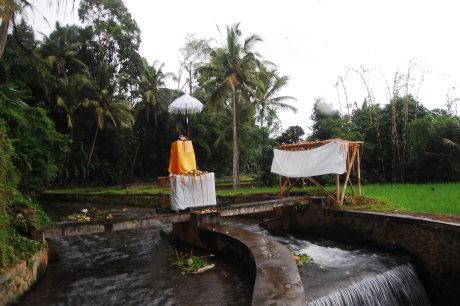
These offerings were made in an irrigation canal of one of the subak systems in Gianyar, a regency northeast of Ubud.
The realm of human beings. Worships and offerings made inside clan temples, home temples and shrines, or even inside cars and houses are dedicated to the people who have the moral duties to establish traditional communities, erect temples in which to worship and hold ceremonies such as daily offerings, and preserve nature and all its contents.

A Balinese Hindu casually making an evening offering before a family temple inside his home compound in Kuta.
Tri Hita Karana is also the single most important backbone of Bali’s inclusion to the UNESCO World Heritage List. Several keys sites in the island were collectively inscribed in 2012 as the “Cultural Landscape of Bali Province: the Subak System as a Manifestation of the Tri Hita Karana Philososphy”.
The post In Photos: Tri Hita Karana appeared first on We Said Go Travel.
Breathing in and Breathing Out in Israel
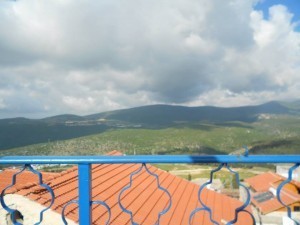 Breath in, breath out. Breath in, breath out. I could breathe for hours, when I stand here. I could sit in this beautiful place, just relaxing. I could let myself to be swept away by the moment, as long as I was here. I could sit here just focusing on now. When I look out over the beautiful scenery before me, there is no need to think about anything else. What I see before me are dark green, rolling, gorgeous mountains. In the morning light, they are natural and pure. They show me what this world could be like. Without hate or war, the world could be as natural, pure, and beautiful as the mountains before me. I feel like this is the most spiritual place I have ever been to. I feel like thousands of wishes, dreams, spirits, and hopes are floating around me. With everything that I think I feel going I going on around me, I have to realize that I am barely physically moving. I am standing relaxed, at peace. I also feel that, here, I’m spiritually at peace.
Breath in, breath out. Breath in, breath out. I could breathe for hours, when I stand here. I could sit in this beautiful place, just relaxing. I could let myself to be swept away by the moment, as long as I was here. I could sit here just focusing on now. When I look out over the beautiful scenery before me, there is no need to think about anything else. What I see before me are dark green, rolling, gorgeous mountains. In the morning light, they are natural and pure. They show me what this world could be like. Without hate or war, the world could be as natural, pure, and beautiful as the mountains before me. I feel like this is the most spiritual place I have ever been to. I feel like thousands of wishes, dreams, spirits, and hopes are floating around me. With everything that I think I feel going I going on around me, I have to realize that I am barely physically moving. I am standing relaxed, at peace. I also feel that, here, I’m spiritually at peace.
You might ask where this place is. This place where I feel so at peace and at home. The place that grants me a kind of fulfillment I never experienced before. I am standing on a balcony in Tzfat, overlooking the Golan Heights. Tzfat is in the north of Israel. It is a place full of rich history and stories just waiting to be discovered. The people who live there are almost as unique as the place itself. It is often thought of as Israel best kept secret. It is a secret that should be shared, yet only with certain people. It is a secret that has been well kept and preserved. It is a secret full of wisdom and knowledge. This little town, this secret, is full of people from all over the world who have come to find something special. They also feel the special feeling that you can only experience in Tzfat.
Tzfat has a kind of pull to certain people. It has a quaint aura about it. It has a spiritual feel that people in a certain mindset can truly enjoy. You have to be open to relaxing and taking your surroundings in. You have to be open to learning from what’s around you, and in turn teaching the people around you what you can. In Tzfat, you are given the opportunity to share your knowledge, abilities, and experiences with the people around you. But Tzfat is more than physical place.
Most people say that Jerusalem is the most spiritual place in Israel. I consider Tzfat to be one of the most spiritual places in Israel. But those people probably have never experienced Tzfat like I have. Tzfat is a different kind of spiritual. Tzfat is quiet. Tzfat is beautifully simple. Tzfat is the kind of place that allows you to take a step back and appreciate life. Tzfat allows you to take life one step at a time. Tzfat allows you to forget about time and remember to be in the now. Tzfat allows you to breathe. So breath in, breath out. Breath in, breath out.
About the Author: Sarina Maurice is currently a student. She was born in Israel, but is American and British as well.
Thank you for reading and commenting. Please enter our next Travel Writing competition and tell your story.
The post Breathing in and Breathing Out in Israel appeared first on We Said Go Travel.
We Said Go Travel
We Said Go Travel is a global community of over sixteen hundred writers with articles from every continent.
Stories are shared with photos and video from a perspective of the transformative power of travel. We Said Go Travel has hosted live and online events as well as travel writing contests around the world. ...more
- Lisa Niver's profile
- 57 followers


